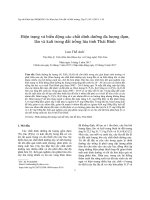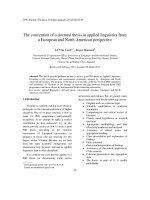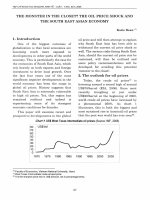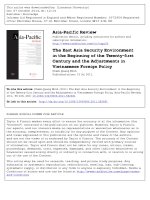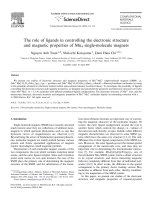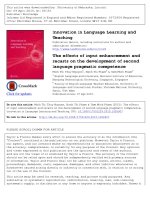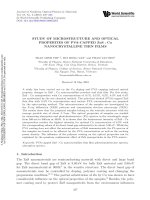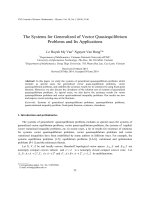DSpace at VNU: The crystallization, magnetic and magnetocaloric properties in Fe76.5-xNbxSi15.5B7Au1 ribbons
Bạn đang xem bản rút gọn của tài liệu. Xem và tải ngay bản đầy đủ của tài liệu tại đây (235.43 KB, 3 trang )
ARTICLE IN PRESS
Journal of Magnetism and Magnetic Materials 310 (2007) 2483–2485
www.elsevier.com/locate/jmmm
The crystallization, magnetic and magnetocaloric properties in
Fe76.5ÀxNbxSi15.5B7Au1 ribbons
N.Q. Hoaa,b, D.T.H. Gama, N. Chaua, N.D. Thea,b, S.-C. Yub,Ã
a
Center for Materials Science, College of Science, Vietnam National University, Hanoi, 334 Nguyen Trai Road, Hanoi, Vietnam
b
Department of Physics, Chungbuk National University, Cheongju 361-763, Republic of Korea
Available online 27 November 2006
Abstract
Fe76.5ÀxNbxSi15.5B7Au1 ribbons (x ¼ 0.0, 1.5, 3.0, 4.5) have been fabricated by rapid quenching technique. The DSC measurements
indicated that both first exothermal peak Tp1 (of a-Fe(Si) phase) and second peak Tp2 (of boride phase) as well as crystallization
activation energy increase with increasing Nb content substituted, whereas saturation magnetization of samples decreases with x, due to
ferromagnetic dilution. Besides, Curie temperature of amorphous phase decreases with x, i.e. Nb stabilizes amorphous structure of
ribbons. The investigation of magnetic entropy change of studied samples showed that it may lead to magnetocaloric effect around
respective Curie temperature of amorphous phase.
r 2006 Elsevier B.V. All rights reserved.
PACS: 75.50.Tt; 75.30.Sg; 75.50.Kj; 75.50.Bb
Keywords: Soft magnetic amorphous system; Melt-spun; Magnetocaloric effect; Nanocrystalline matirials
It was shown that the crystallization of Fe–Si–B
amorphous alloys containing Nb and Cu causes the
formation of nanoscale BCC structure [1]. Cu and Nb
atoms play a very important role in producing the
nanocrystalline structure. A small amount of Cu (with
melting temperature Tm ¼ 1083 1C) to form a-Fe(Si) phase
as crystallization nucleation, but Nb with high melting
temperature (Tm ¼ 2468 1C) ascribed to hinder the grain
growth, which are decisive factors to achieve the ultra-soft
magnetic properties. In the previous papers, we have
studied the influence of Ag, Zn and Au in Finemet [2–4] on
the properties of ribbons. This article presents study on
influence of Nb content substituted for Fe in Fe76.5Àx
NbxSi15.5B7Au1 alloys on their structure, crystallization
and properties.
Fe76.5ÀxNbxSi15.5B7Au1 ribbons (x ¼ 0.0, 1.5, 3.0, 4.5)
have been fabricated by rapid quenching with 25 mm
thickness and 6 mm wide. Structure of as-cast samples
was checked by X-ray diffractometer D5005 and the results
ÃCorresponding author. Tel.: +82 43 2612269; fax: +82 43 2756415.
E-mail address: (S.-C. Yu).
0304-8853/$ - see front matter r 2006 Elsevier B.V. All rights reserved.
doi:10.1016/j.jmmm.2006.11.088
(Fig. 1) show that beside sample x ¼ 0 which is partly
crystallized, the containing Nb alloys are fully amorphous.
The DSC measurements indicated that first exothermal
peak corresponding to crystallization of a-Fe(Si) phase
increased from 502 to 555 and 576 1C for ribbons x ¼ 1.5,
3.0, 4.5, respectively. A similar tendency is found for
second crystallization peak of boride phase (676, 716 and
722 1C, respectively).
The DSC curves were measured in different heating rates
from 10 to 50 1C/min and from the Kissinger plots, the
crystallization activation energy for a-Fe(Si) phase, Ea1, as
well as for boride phase, Ea2, has been determined and
shown to be increased, both, with increasing Nb content
existed in the samples.
The magnetic measurements showed that saturation
magnetization of as-cast ribbons consequently reduced
with higher value of x, namely, Ms ¼ 147 (x ¼ 1.5), 134
(x ¼ 3.0) and 112 emu/g (x ¼ 4.5) due to ferromagnetic
dilution.
The M(T) curves of samples measured in low field of
5 mT with heating and cooling cycle are presented in Fig. 2.
We define DTcr ¼ TonsetÀTC as the stabilizing temperature
ARTICLE IN PRESS
2484
N.Q. Hoa et al. / Journal of Magnetism and Magnetic Materials 310 (2007) 2483–2485
Fig. 1. X-ray diffraction patterns of as-cast ribbons Fe76.5ÀxNbxSi15.5
B7Au1.
Fig. 2. Thermomagnetic curves of studied samples Fe76.5ÀxNbxSi15.5
B7Au1 in field of 5 mT, (1) heating cycle, and (2) cooling cycle.
Table 1
Several characteristics of Fe76.5ÀxNbxSi15.5B7Au1 ribbons
Sample
x ¼ 1.5
x ¼ 3.0
x ¼ 4.5
Ea1 (eV)
Ea2 (eV)
Ms (as-cast) (emu/g)
Ms (annealed) (emu/g)
TC (1C)
DTcr (1C)
D (nm)
a (nm)
jDSmjmax (J/kg K)
1.92
3.40
147
160
385
80
21.5
0.2840
2.4
2.50
4.62
134
142
345
220
10.8
0.2842
2.3
2.62
4.84
112
139
307
320
8.6
0.2845
2.0
region of amorphous phase, in which no phase transition is
detected. Table 1 collects parameters of alloys including
DTcr and obviously DTcr increases with increasing Nb
content, namely DTcr ¼ 80 (x ¼ 1.5), 220 (x ¼ 3.0) and
320 1C (x ¼ 4.5), i.e. Nb plays the role of stabilizing
amorphous structure.
Fig. 3. Hysteresis loops of samples Fe76.5ÀxNbxSi15.5B7Au1 (x ¼ 1.5).
The samples are annealed at appropriate temperatures
and keeping time with crystallization volume fraction of
around 82%. After annealing, materials become nanocomposites with nanocrystallites a-Fe(Si) embedded in remaining amorphous matrix. Once again from Table 1, we can
see that Nb plays the role of limitation of grain growth,
namely, particle size D ¼ 21.5 (x ¼ 1.5), 10.8 (x ¼ 3.0) and
8.6 nm (x ¼ 4.5). From Table 1, we also recognize that
lattice parameter of annealed samples increases with
increasing Nb content. Yavari et al. pointed out that
possibility of some atomic percentages of niobium, which
are solved in the nanocrystallites, might be taken into
account [5]. During the crystallization process, it is
assumed that niobium is rejected into the amorphous
boundary phase causing an inhomogeneous distribution,
consequently, an accumulation of Nb at the boundary of
the nanocrystalline grains occurred. Hence, it seems that
the higher value of the lattice constant was originated from
the diffusion of Nb into the Fe–Si crystallites (see Table 1).
Because of nanosize and appropriate volume fraction of
a-Fe(Si) phase, the soft magnetic properties of annealed
sample have been remarkably improved comparing with
those of as-cast sample (Fig. 3). Magnetic entropy change,
|DSm|, as a function of temperature was evaluated by
measuring a series of isothermal magnetization curves
around Curie temperature of amorphous phase. The results
indicate that |DSm| established as high as around respective
Curie temperature of amorphous phase (see Table 1).
In conclusion, the structure, crystallization and magnetic
properties of Fe76.5ÀxNbxSi15.5B7Au1 alloys have been
examined. The crystallization temperature, crystallization
activation energy, stabilizing temperature region of amorphous phase as well as lattice parameter increase with
increasing Nb content in the samples, whereas saturation
magnetization, Curie temperature of amorphous phase as
well as particle size decrease. The role of Nb is discussed in
detail.
ARTICLE IN PRESS
N.Q. Hoa et al. / Journal of Magnetism and Magnetic Materials 310 (2007) 2483–2485
We acknowledge Korean Science and Engineering
Foundation through the Research Center for Advanced
Magnetic Materials at Chungnam National University and
Vietnam National Fundamental Research Program for
Natural Sciences for financial support of this work.
References
[1] Y. Yoshizawa, S. Oguma, K. Yamauchi, J. Appl. Phys. 64 (1988) 6044.
[2] N. Chau, N.Q. Hoa, N.H. Luong, J. Magn. Magn. Mater. 290 (2005)
1547.
2485
[3] N. Chau, N.Q. Hoa, N.D. The, L.V. Vu, J. Magn. Magn. Mater. 303
(2006) e415.
[4] N. Chau, N.Q. Hoa, N.D. The, P.Q. Niem, J. Magn. Magn. Mater.
304 (2006) e179.
[5] A. Reza Yavari, G. Fish, S.K. Das, L.A. Davis, Mater. Sci. Eng.
A 181/A182 (1994) 1415.
